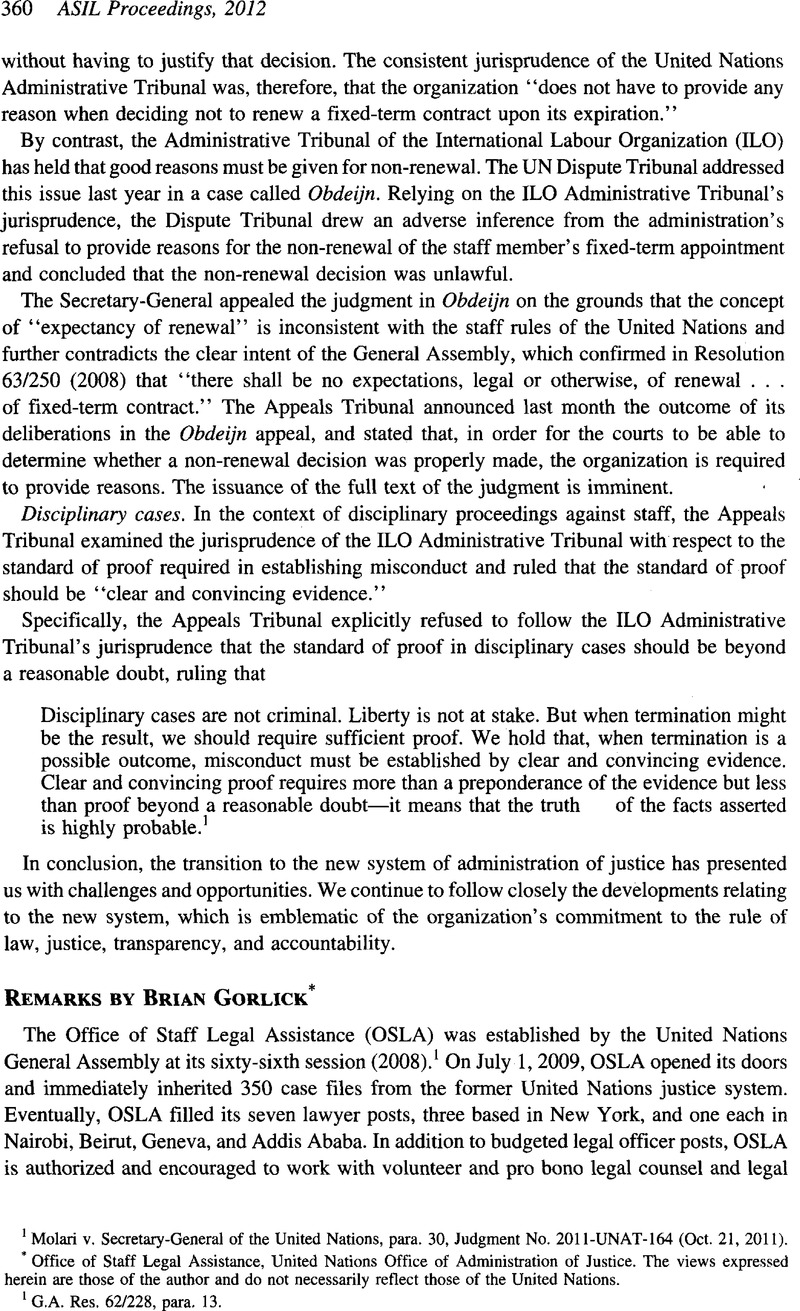Article contents
Remarks by Brian Gorlick
Published online by Cambridge University Press: 28 February 2017
Abstract

- Type
- New Trends in the Administration of Justice of International Organizations
- Information
- Copyright
- Copyright © American Society of International Law 2012
References
1 G.A. Res. 62/228, para. 13.
2 Guiding Principles of Conduct for Osla Affiliated Counsel in the United Nations, available at http://www.un.org/en/oaj/legalassist/pdf/osla_consel_code_of_conduct.pdf.
3 In the United States context, see Brzak et al. v. United Nations, 597 F.3d 107 (2d Cir. 2010) (referring to the Convention on the Privileges and Immunities of the United Nations, which unequivocally grants the United Nations absolute immunity without exception). The court also noted that the International Immunities Act of 1945 provides that international organizations designated by the President should receive “the same immunity from suit and every form of judicial process as is enjoyed by foreign governments.” Id. at 112. The United Nations has been so designated. Exec. Order No. 9698, 11 Fed. Reg. 1809 (Feb. 19, 1946).
4 See also Challenging Acts of International Organizations Before National Courts (August Reinisch ed., 2010); Ryngaert, Cedric, The Immunity of International Organizations Before Domestic Courts: Recent Trends, 7 Int’l Orgs. L. Rev. 121-48 (2010)Google Scholar.
5 See General Assembly Resolution 63/253, under the UNDT (Art. 10(6)) and UNAT (Art. 9(2)) statutes, where the Tribunals determine that if a party has manifestly abused the proceedings, it may award costs against that party.
6 As noted by former UNDT Judge Michael Adams, “His lawyers can claim that the Secretary-General should be considered as a head of state as much as they like, but he leaves his crown outside the courtroom.” UNDT/2010/080, para. 27.
7 G.A. Res. 61/261, para. 4.
8 See Report of the Internal Justice Council, Administration of Justice at the United Nations, UN Doc. A/66/158, at 11-14.
9 See General Assembly Resolution 66/237, in which the General Assembly “Notes with appreciation the achievements produced since the inception of the new system of administration of justice in regard to both the disposal of the backlog and the addressing of new cases, despite the numerous difficulties faced during the implementation of the new system of administration of justice” (para. 4); and “Notes the important role of the Office of Staff Legal Assistance in providing legal assistance to staff members in an independent and impartial manner, and also notes that the Office currently represents staff members in cases before the Dispute Tribunal in New York, Geneva and Nairobi and before the Appeals Tribunal” (para. 26).
10 Judge Courtial of the UNAT has noted that “[t]he UNAT exists, this is true, but it is weak and powerless... and lacks sufficient staffing.” Meeting with UN Appeals Tribunal judges, UN Secretariat, New York, 2011.
- 1
- Cited by


